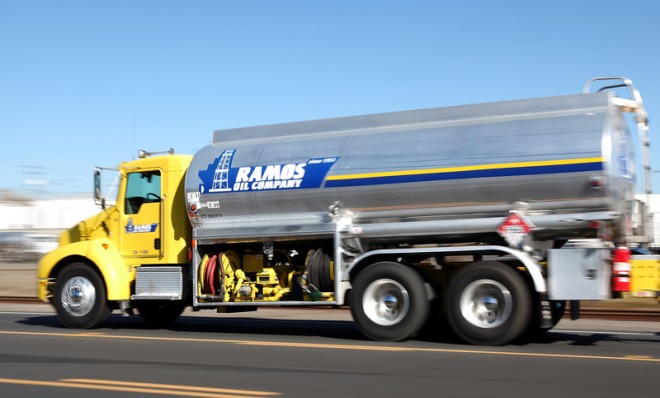How Wall Street banks are turning into commodities cartels
The financial industry has become super-concentrated, sparking concerns of anti-competitive behavior

A free daily email with the biggest news stories of the day – and the best features from TheWeek.com
You are now subscribed
Your newsletter sign-up was successful
Thanks to the financial crisis, the vampire squids of the world have tentacles in more areas of the economy than ever before.
The Federal Reserve and the Senate Banking Committee are set to meet later this month to discuss whether banks should be allowed to buy, store, and transport physical commodities like oil tankers and pallets of copper — a decision that could have an impact on bottom lines of some of Wall Street's biggest banks, and determine the limits of the financial industry's role in the economy.
Here's some background: In 1999, Congress passed the Gramm-Leach-Bliley Act, which famously repealed parts of the Glass-Steagall Act that had separated investment banking from traditional banking. The 1999 law also allowed commercial banks to trade in commodities, with certain restrictions in place, like getting approval from the Fed.
The Week
Escape your echo chamber. Get the facts behind the news, plus analysis from multiple perspectives.

Sign up for The Week's Free Newsletters
From our morning news briefing to a weekly Good News Newsletter, get the best of The Week delivered directly to your inbox.
From our morning news briefing to a weekly Good News Newsletter, get the best of The Week delivered directly to your inbox.
At the same time, independent investment banks like Goldman Sachs and Morgan Stanley were already building large commodities units. Goldman Sachs, for example, owns a coal mine in Colombia and a metals warehouse in Detroit.
When Lehman Brothers collapsed in 2008, however, Goldman and Stanley transformed into regular bank-holding firms, which qualified them for emergency relief funds from the Fed. They also came under a new set of regulations, and were given five years to adapt their businesses to meet the restrictions of the Gramm-Leach-Bliley Act.
Meanwhile, in March, 2008, JPMorgan acquired investment bank Bears Stearns in a fire sale, and along with it came some warehousing and electricity assets.
"All of a sudden, three 'banks' were active in markets most rivals had been banned from," explains Fancesco Guerrera at The Wall Street Journal.
A free daily email with the biggest news stories of the day – and the best features from TheWeek.com
The five years are up, but the banks — surprise, surprise — have not shed their commodities units. It's unclear how big these divisions are, but "there are signs they could be vast," according to Lina Kahn of Salon. "In its 2012 shareholder report, Goldman Sachs notes it partly owns and operates airports, toll roads, and shipping ports."
Wall Street's commodities business has come under increased scrutiny this summer. JPMorgan, for example, paid $410 million in July to settle charges that its commodities unit had manipulated power markets.
Then in August, federal regulators subpoenaed Goldman Sachs over complaints that the bank's metal warehouses have been delaying shipments to inflate aluminum prices — possibly costing consumers around $5 billion since 2010.
The regulatory pressure is more than about curbing alleged foul play. "There is great potential for dangerous conflicts of interest when banks control the supply of physical goods while speculating on their futures," Sherrod Brown (D.-Ohio), a member of the Senate Banking Committee, told Guerrera.
Kahn of Salon lays the conflict out like this:
Tearing down the last firewall between the financial industry and the real economy could also affect lending by pitting banks against their customers. If a rival warehouse company were in search of credit, for instance, would Goldman Sachs freely provide it? This kind of conflict is "increasingly a valid concern," said Simon Johnson, former chief economist at the International Monetary Fund. "Finance has become much more concentrated, especially since the crisis, so where you might once have had more competition for financing, now you see potential for manipulation or cartel-like activity." [Salon]
Finally, even if banks don't manipulate prices or stifle competition, there's still a concern over "whether real-world markets create large and unquantifiable financial risks that banks can't manage," says David Sheppard at Reuters. "Incidents like the Exxon Valdez spill, or even this summer's oil-train tragedy in Canada, can have multibillion-dollar consequences."
A big enough disaster "may endanger a bank's existence," says Guerrera. Which in turn could imperil the financial system as a whole.
You can see why the Senate and the Fed are taking time out of their jam-packed September schedule to address the issue.
The banks note that the Gramm-Leach-Bliley Act includes a clause that allows any bank that becomes a bank-holding firm to continue "activities related to the trading, sale, or investment in commodities and underlying physical properties," just as long as they were involved in the commodities business before 1997, explains Kahn. Goldman Sachs and Morgan Stanley say they're covered by that clause.
The Fed and the Banking Committee will meet on September 24.
Carmel Lobello is the business editor at TheWeek.com. Previously, she was an editor at DeathandTaxesMag.com.
-
 What to know before filing your own taxes for the first time
What to know before filing your own taxes for the first timethe explainer Tackle this financial milestone with confidence
-
 The biggest box office flops of the 21st century
The biggest box office flops of the 21st centuryin depth Unnecessary remakes and turgid, expensive CGI-fests highlight this list of these most notorious box-office losers
-
 The 10 most infamous abductions in modern history
The 10 most infamous abductions in modern historyin depth The taking of Savannah Guthrie’s mother, Nancy, is the latest in a long string of high-profile kidnappings